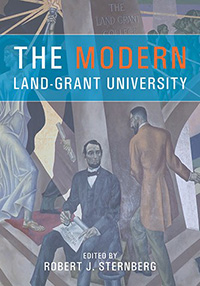By Karene Booker
Reprinted from Cornell Chronicle, July 23, 2014
 The land-grant university, 150 years after its inception, remains an extraordinary and compelling model for higher education, with ideas and ideals relevant to even the most elite academies, contends Professor Robert Sternberg in his edited volume, “The Modern Land-Grant University” (Purdue University Press).
The land-grant university, 150 years after its inception, remains an extraordinary and compelling model for higher education, with ideas and ideals relevant to even the most elite academies, contends Professor Robert Sternberg in his edited volume, “The Modern Land-Grant University” (Purdue University Press).
“Land-grant institutions perhaps best represent the very core of what greatness means in American society – namely, equal opportunity for all and, through it, the chance to make our society and the world a better place,” says Sternberg, professor of human development in Cornell’s College of Human Ecology.
“Land-grant universities are about educating students, not just to be knowledgeable and smart, but also to be wise and ethical … to become future leaders, who will change the world in positive, meaningful and enduring ways,” he says.
The book provides a current and comprehensive review of the role and function of land-grant institutions, with four sections exploring the core mission, environment, public value and accountability of the modern land-grant university. The volume’s 20 chapters feature perspectives on teaching, research and outreach; undergraduate and graduate academic experience; economic development and entrepreneurship; diversity; promotion and tenure; and more. Sternberg’s epilogue concludes the volume with a summary of the values underlying the activities of land-grant institutions.
“The Modern Land-Grant University” offers university administrators, trustees, educational policymakers, faculty and staff not only a vision for higher education founded on the commitment to public service, but also practical insights for navigating today’s challenges.
Karene Booker is an extension support specialist in the Department of Human Development.
Related Links:
College of Human Ecology
Robert Sternberg
"The Modern Land-Grant University"

